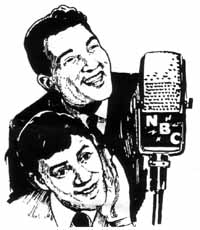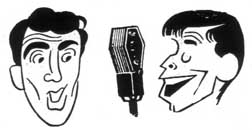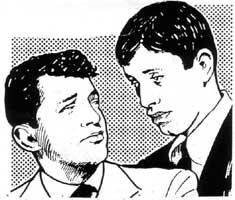|

This story was published in Radio Recall, the journal of the Metropolitan Washington Old-Time Radio Club, published six times per year.
Click here to return to the index of selected articles.
|
|

Part One: The 1949-50 Series
by Michael Hayde © 2003
Last November, CBS television presented a two-hour docudrama about the comedy team of Dean Martin and Jerry Lewis. Although somewhat rushed, the TV movie did an adequate job of covering the 10-year joint career of these two showbiz legends. The motion picture career, the television shows, the nightclubs and other personal appearances - practically every aspect of the team's work was highlighted, except one: radio.
| Unfortunately, this isn't a surprise to anyone familiar with either man. Read any biography of Martin or Lewis and you'll find, at most, a few sentences about their radio career. The unanimous verdict is that their audio work was uninteresting because the team had to be seen to be appreciated. However, this conclusion wasn't reached by consulting the actual shows, but rather what was said about them at the time. |

Illustrations by Bobb Lynes
|
NEWSWEEK: "The freshness of the Martin - Lewis humor - so evident on the nightclub floor - was, on the air, a sometime thing."
TIME: "Radio cannot show the half of what Martin & Lewis have; they must be seen, on television or in a nightclub."
RADIO AND TV LIFE: "The studio audience seemed to enjoy the program tremendously, as all audiences who see the pair do."
But there's more to the story than these terse observations. Radio may not have been as friendly to Martin & Lewis as television, but the best of it showcased their comedy more effectively than their movies, which usually shoehorned them into trite storylines and stereotyped characters.
This part of their story begins in the fall of 1948, when, one-by-one, most of the major stars of NBC radio defected to CBS. Performers such as Jack Benny, Burns and Allen, and Amos 'n' Andy were lured away by more money and the opportunity to own their shows. Reluctantly, NBC realized that, in order to stay in business, they would have to pursue new talent with exclusive contracts covering both radio and television. In December, they announced their first acquisition: Martin & Lewis.
Two years earlier, in an Atlantic City nightclub, Martin and Lewis had come together almost by accident. The smooth, 29 year-old Italian, born Dino Crocetti, had been trying to make the big time as a crooner for about ten years, but he had a lot of rough edges as a performer that were keeping him from the big time.
The 20 year-old who'd been born Joseph Levitch had been trying to break into show business almost since he'd reached school age, mainly because his parents were vaudevillians. It helped that he looked like a comedian - a stark skinny body with a rubber face planted on top - but what kept him from the big time was his pronounced discomfort when speaking on stage.
The two had been introduced by mutual friends in New York City, and whenever they happened to share the bill, each would clown around during the other's act. Dean made Jerry feel comfortable enough to begin using comic voices and slapstick, and Jerry gave Dean the confidence to relax and hone his own brand of sly comedy.
Each one brought out the best in the other. A reviewer for BILLBOARD noticed that the twosome "has all the makings of a sock act," and within three days after deciding to pair up officially, there were lines along the boardwalk in Atlantic City. Over the next two years, their madness spread to bigger and better night clubs, culminating in a two-week booking at the Copacabana that ended up lasting a month and a half.
| In August 1948, the team made its Hollywood debut at Slapsie Maxie's, and within weeks they had not only hired away the club's house band, Dick Stabile and his Orchestra; they also signed contracts with movie producer Hal Wallis, Capitol Records... and NBC. |
 |
Not surprisingly, the first thing the future "Peacock Network" did for the boys was to put them on television. They appeared on a pre-Milton Berle "Texaco Star Theater" in August, and did three consecutive weeks on "Welcome Aboard," a variety show sponsored by Admiral Television, in October. But TV was still a poor stepchild compared to radio, and NBC was determined to broadcast the team over the popular airwaves in their own series.
The week after their third "Welcome Aboard" show, they guest-starred on Bob Hope's radio program, and returned four weeks later. Meanwhile, NBC hired writers Dick McKnight and Ray Allen, and producer/director Robert L. Redd, to concoct a series for the team. Finally, on December 21st 1948, Martin & Lewis recorded an audition for their own starring show, with Lucille Ball as guest. The audition survives and circulates in two versions: an unedited tape running 37 minutes, and a 30-minute, edited for broadcast version.
This pilot set the stage for the series to come. Not so surprisingly, McKnight, Allen and a handful of other scribes came up with a psuedo-situation comedy. Martin and Lewis portrayed Martin & Lewis, a hot new comedy team, and the "plots" focused on their attempts to get their show on the air, find a sponsor, come up with a new nightclub act, make a new record for Capitol, and so forth. Inevitably, Jerry's nonsense would interfere with the job at hand, and Dean would have to set things straight - if he could.
Along the way, they'd interact with a guest star and deal with any number of crazy supporting characters, especially their scatterbrained secretary, Florence, played by Flo McMichaels. Of course, there would be musical interludes: Dean would sing two songs completely straight. It was a tried-and-true format bequeathed to numerous comedians by the master, Jack Benny.
As the new series drew closer to its debut date of April 3, 1949, NBC made certain that Martin & Lewis were heard on their part of the dial. They did a spot on a "March of Dimes" special on January 31. On February 10, they appeared on "Chesterfield Supper Club," and ten days later, they did "Sealtest Variety Theater," hosted by Dorothy Lamour. Five days before their premiere, they returned to "The Bob Hope Show."
Somehow, in the slipshod history of Dean and Jerry's radio career, the audition with Lucille Ball has been tagged as the series opener. Where this idea originated is a mystery, because the contemporary evidence - newspaper ads and reviews, magazine and trade paper reviews, NBC's files, and the show that aired seven days later - assert that Bob Hope was the guest on the premiere of "The Martin & Lewis Show", April 3rd.
The Hope program used nearly the same script as the audition, although there's some variance in the plot during the second half. It's possible that the misconception arose because the premiere circulates only in a 42-minute unedited tape; not even the Library of Congress has unearthed the broadcast version.
All told, NBC spent about ten thousand dollars a week on the show, two thousand of which went to the stars. There was no sponsor - the only ads were public service announcements for US Savings Bonds (even these ended after the first month). The first four weeks were transcribed from Hollywood, where Dean and Jerry were finishing up their first film for Hal Wallis. This was also radio-related: an adaptation of the popular sitcom "My Friend Irma", which put them in a somewhat uncomfortable position - the highly-touted new stars of NBC debuting in the movie version of a top five CBS radio show, and having to promote it on their own series to boot. Once production wrapped on "My Friend Irma", "The Martin & Lewis Show" moved to New York City.
While in New York, guests came from the theatre district, along with movie stars who happened to be in town. Sometimes these performers weren't happy with how the shows turned out. After having taped her appearance, actress Madeleine Carroll requested that it not be aired. Failing to sign a replacement in time, the staff whipped up a script and taped a new show without a guest, but the result was so poor that the show with Ms. Carroll had to be used, and it aired on May 1, 1949.
NBC claimed that the team had received offers from fourteen sponsors - unfortunately, they were offers to do a show on television. Martin and Lewis declined, wanting to succeed in radio first. Commenting on this, RADIO AND TV LIFE magazine added, "How can they be so blind to the fact that they are an extremely dull couple on the air, and extremely funny when seen?" The problem with "The Martin & Lewis Show" was that it was a situation comedy with too much "situation" and not enough comedy. In some cases, the plots seemed to dare the team to be funny.
A perfect example of this is the program of June 21, 1949, its debut as Bob Hope's summer replacement. VARIETY reviewed the show and commented that "there's still considerable polishing to be done." The plot had a member of Tony Martin's fan club take Dean to court to stop him from using the name Martin. Said VARIETY, "Any charm and cleverness that this turn might have had was dissipated by some inept writing. It was surprising that either (man) went for this type of show which virtually forced listeners to make up their minds as to which singer is better." Hearing it today, the whole show seems like an overlong, unfunny lead-in for the finish, when the two Martins sing a duet on "Anything You Can Do, I Can Do Better."
On July 19, the show moved back to Hollywood. Ben Alexander took over as announcer and Sheldon Leonard came aboard as a new running character: Soapie, a neighbor who involves the boys in some crazy, expensive schemes, one of which led to a storyline that lasted several weeks, beginning with the show of August 16, where he convinces them to buy their own nightclub. Leonard's character, and his patented Damon Runyon-esque voice, definitely added some life to the show, but when a supporting player gets bigger laughs than the stars, something's wrong.
 After twelve weeks in Bob Hope's spot, and still no sign of a sponsor, NBC took the show off after the broadcast of September 6. Meanwhile "My Friend Irma" opened. Most critics hated the movie but loved the team, and finally Mr. and Mrs. Average American discovered that these two guys really were funny. While the film did tremendous business, NBC brought "The Martin & Lewis Show" back to the air on Friday October 7 at 8:30pm. After twelve weeks in Bob Hope's spot, and still no sign of a sponsor, NBC took the show off after the broadcast of September 6. Meanwhile "My Friend Irma" opened. Most critics hated the movie but loved the team, and finally Mr. and Mrs. Average American discovered that these two guys really were funny. While the film did tremendous business, NBC brought "The Martin & Lewis Show" back to the air on Friday October 7 at 8:30pm.
They plugged their return by appearing with Uncle Miltie on October 18, but it still didn't help. Although written now by Charley Issacs and Jack Douglas, it was the same old show, with the same tired situations and running gags offset by an occasional belly-laugh. After 13 additional weeks, NBC threw in the towel: "The Martin & Lewis Show" departed for good after the broadcast of January 30th, 1950. By then, Dean and Jerry had begun work on a sequel to "My Friend Irma", and began thinking seriously about television.
In retrospect, it's a testament to NBC's faith in Martin & Lewis to have kept their series running for 40 weeks without a sponsor or decent ratings. The team had griped back in October that the network spent more on promotion than production, and this is a valid point. When the show premiered, practically nobody but nightclub patrons had ever heard of them. Maybe if the writing had been stronger, and the boys had been freer with their own schtick, it might have been a different story.
In fact, it seemed that every time they did a guest shot - such as on Bob Hope's show, or the Armed Forces program "Command Performance" - the result was livelier and funnier than their own weekly program.
To date, 25 of the 40 episodes in this series are in circulation (a few early ones in rehearsal versions only). Nearly all of the rest can be heard at the Library of Congress.
NEXT ISSUE: Martin and Lewis return to radio... on their terms.
|